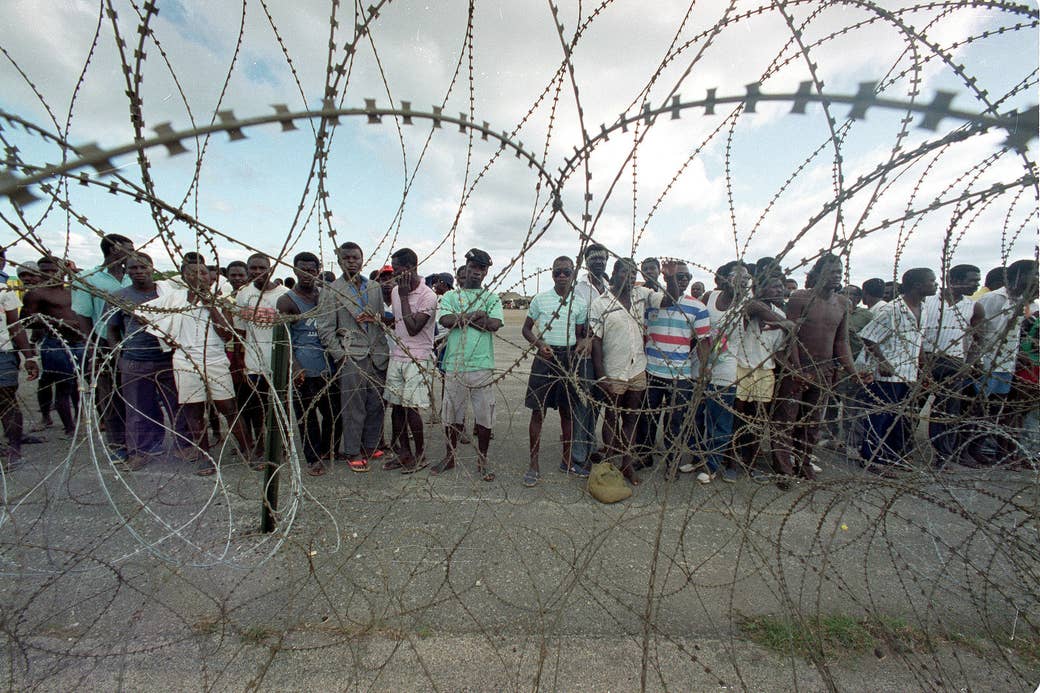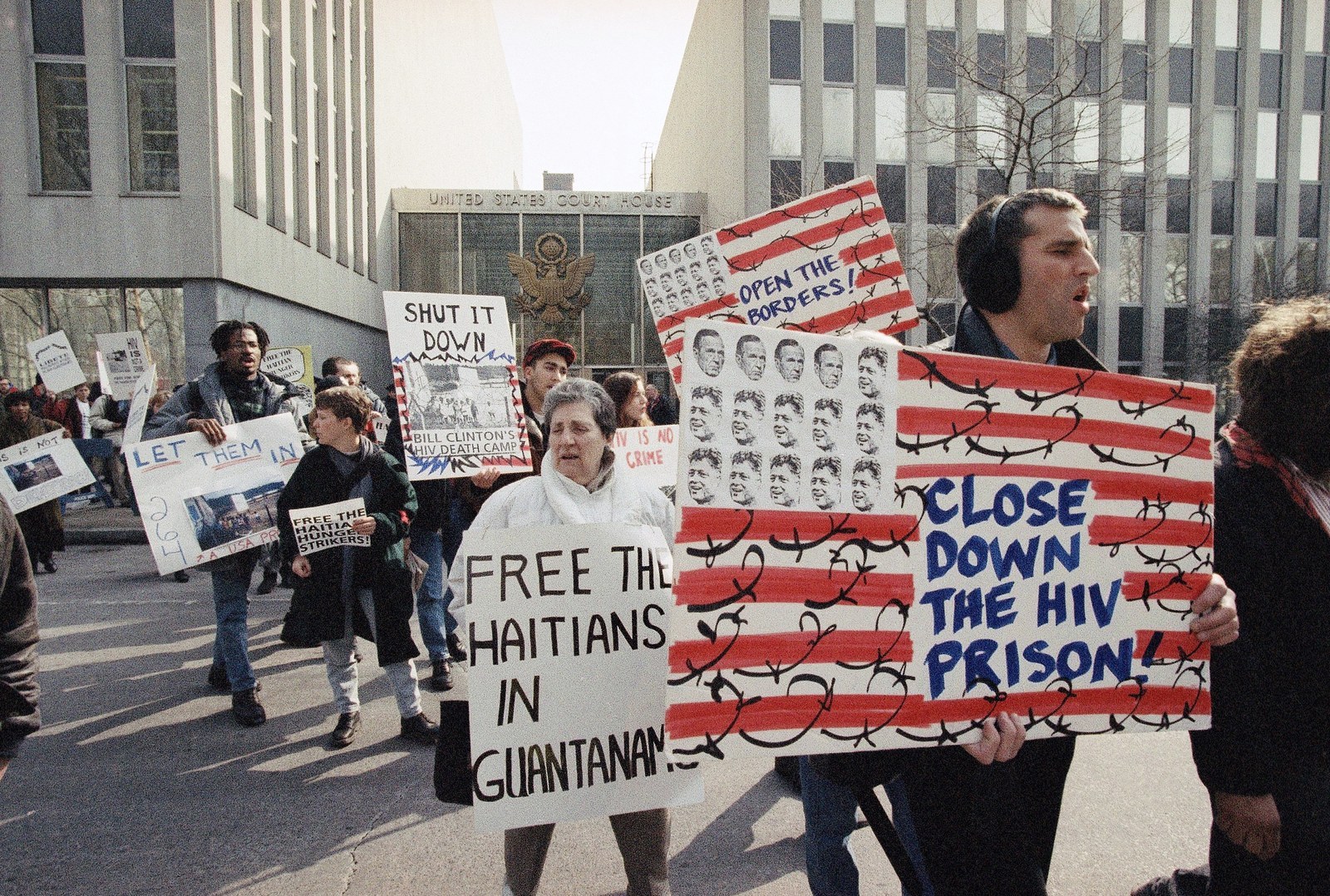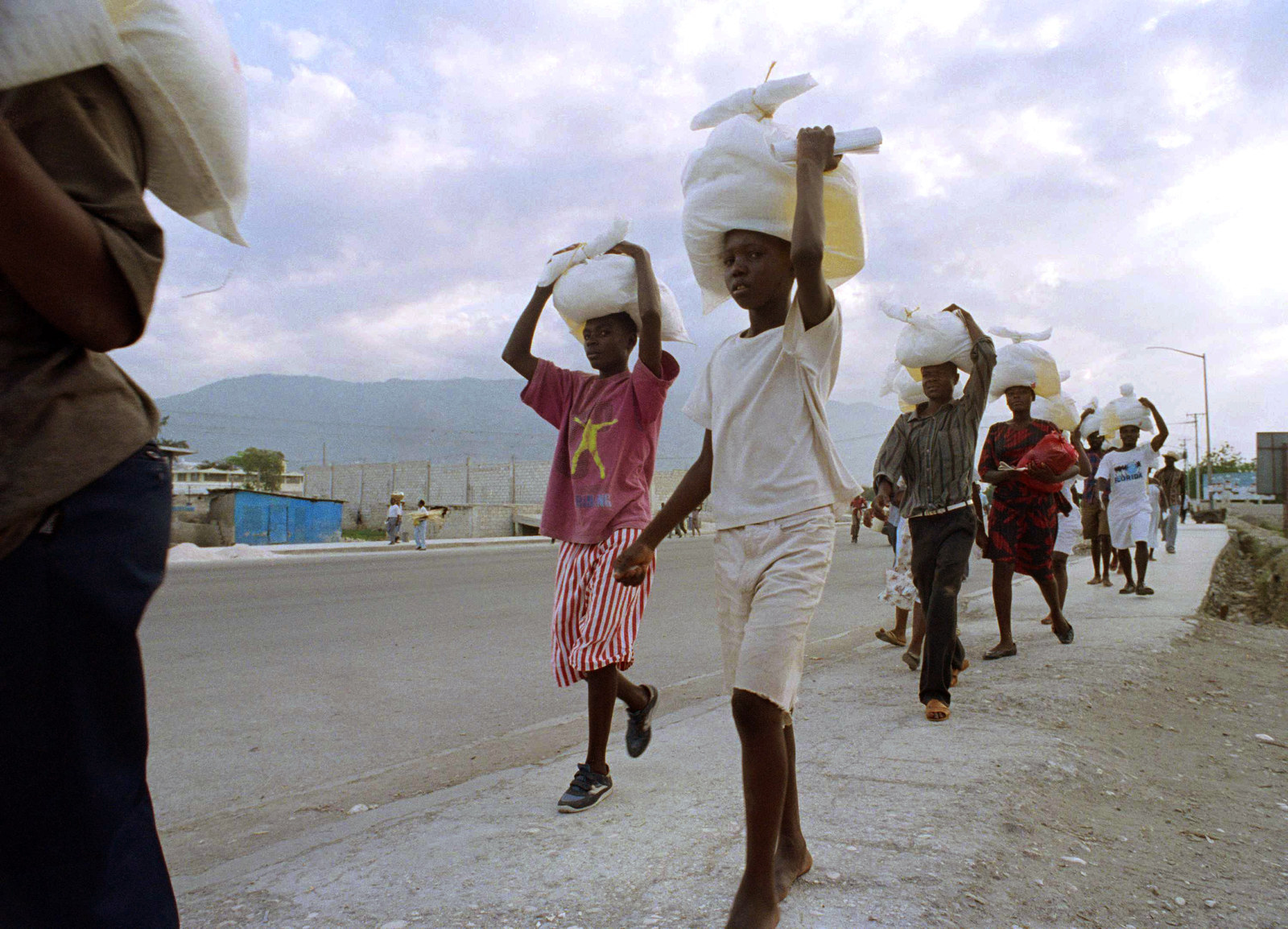
WASHINGTON — President Barack Obama heads to Cuba this weekend with the shadow of Guantanamo Bay hanging over him. He has made a last ditch effort to close the base, which holds dozens of detainees linked to the “war on terror.”
Entirely ignored in that debate is the fact that Guantanamo also holds another group of people the U.S. doesn’t want to let into the country: people fleeing persecution — mostly from Cuba and Haiti — who the Coast Guard picked up at sea before they made it to U.S. shores. The U.S. can’t send them home — to return those believed to have a well-founded fear of persecution would be a violation of international law — so the U.S. takes them into what the government calls “protective custody” at Guantanamo.
Today, just eight people are held in what the government calls the Migrant Operations Center in Guantanamo, a building reminiscent of a budget hotel on an isolated side of the base far from its commercial district and the military detention center.
If they had managed to set foot on dry land in Florida, they would have a right to request asylum in the United States and would be entitled to lawyers and other legal protections as their claims were processed. But since they were picked up at sea, they have no right to asylum in the United States and instead have their cases processed at Guantanamo Bay, where they have no access to lawyers or courts. If they prove their persecution claims to the satisfaction of a U.S. official, they are resettled abroad, not in the U.S.
In the run up to Obama’s visit to Cuba this weekend, the White House affirmed that it would leave what’s known as the “wet-foot, dry-foot” policy unchanged. That means it will continue using Guantanamo Bay to process those who have a credible fear of persecution.
The numbers now held in the Migrant Operations Center are small, though 121 people have been resettled from there since Obama took office. Lawyers who have fought the program say that, regardless of the numbers, it keeps Guantanamo as a place outside the Constitution for people fleeing persecution even as the Obama administration says it is trying to comply Supreme Court rulings that the Constitution must apply to people in military detention.
“It’s inconsistent as a matter of policy … [to] close that part of Guantanamo and bring alleged terrorists into the United States while keeping bonafide refugees detained,” said Ira Kurzban, a Florida immigration lawyer who first sued on behalf of thousands of Haitian refugees captured at sea while fleeing after a coup 1991. “There’s just no justification for that.”

The U.S. government used Guantanamo to warehouse thousands of people fleeing persecution for at least a decade before the military base became known to world as the home of the dozens held in the name of fighting terrorism.
The White House turned to the base at a time when there was widespread fear in the United States that large numbers of refugees would unleash a threat that many Americans hoped could be contained abroad.
The country at the time was Haiti, which had been viewed as a security threat to the United States since the late 1700s, when slaves overthrew their masters and set up the first black-led government in the Americas just off the coast of Florida. This continued through the administration of President Ronald Reagan, who struck a deal with the country’s then-dictator in 1981 to return any Haitians caught fleeing by sea because these migrants “threatened the welfare and safety and communities” in the U.S.
When a new wave of thousands fled Haiti after a 1991 coup, there was an additional fear: HIV. The Reagan administration declared HIV a “dangerous contagious disease” in 1987 and barred those carrying the virus from entering the United States. Haitians, like gay men, were widely perceived as especially dangerous carriers of the virus from the early days of the epidemic in the United States. Haitians living in the U.S. were evicted from their homes, had their businesses boycotted, and encountered graffiti like “Haitians = Niggers with AIDS.”
A court briefly blocked President George H. W. Bush from returning thousands of Haitians who had been stopped at sea by the Coast Guard because they might have valid asylum claims. Rather than bring them to the U.S., he ordered a camp of tents and razor wire built for them on the Guantanamo Bay Naval Base, New York Law School Professor Brandt Goldstein recounted in his book about the legal battle that followed, Storming the Court.
It would ultimately hold more than 15,000 people before the administration found a way around the court’s order and resumed simply sending newly apprehended Haitians back. Those on Guantanamo were considered for political asylum, and more than 6,000 were ultimately brought to the United States while thousands of others were ultimately returned. As the Bush administration rushed to empty the camps, around 300 people were stuck in limbo in a compound that had been set up as a camp to “concentrate the HIV-migrants and their families,” Goldstein reported.

The administration was using a special procedure for those with HIV that seemed designed to make their cases fail, Goldstein reported. Most refugees were flown to the U.S. for their final asylum hearing, where they had a right to an attorney. But those with HIV were processed entirely at Guantanamo and were denied attorneys even when they asked for them.
A team from Yale Law School brought two lawsuits on behalf of the Haitians: One challenged the administration’s power to return people picked up on the high seas without evaluating the fear of prosecution. The other one was brought on behalf of those with HIV, arguing that the Constitution guaranteed them access to an attorney and other rights of due process, even on Guantanamo Bay.
The arguments in the second case raised the same set of issues that lawyers for those detained in George W. Bush’s “War on Terror” would raise after 9/11. And the government’s response in 1992 was almost verbatim what its lawyers would argue to justify those detentions.
“Guantánamo is a military base in a foreign country,” a Justice Department lawyer argued in an early hearing in the case of the Haitians. “They’re outside the United States and therefore they have no judicially cognizable rights in United States courts.”
The Yale team hoped that then-President Bill Clinton would free the Haitians before the court had to rule. He won the White House while the matter was in the courts, and had denounced the elder Bush administration’s policy during the campaign. Hillary Clinton had even privately assured the Yale professor leading the litigation, Harold Koh, that she would advocate their cause with her husband during an October 1992 meeting at Yale, Goldstein reported in Storming the Court.
(Koh, who later served as an assistant secretary of state under Bill Clinton and as the department’s legal advisor under Secretary of State Hillary Clinton, declined to speak with BuzzFeed News for this story. Hillary Clinton’s presidential campaign did not respond to a request for comment.)
The trust in Clinton “reflected our naivete about the nature of these political processes,” Tory Clawson, one of the then-law students on the Yale team, told BuzzFeed News.
But in a dramatic about-face that stunned the Yale team, Clinton declared shortly before taking office that he would continue the Bush administration’s practice of returning fleeing Haitians. Once Clinton took office, Bush administration lawyers who lingered at the Justice Department continued to fight Koh and the Yale students all the way to the Supreme Court, where the government trounced the Yale team in the case concerning rights on the high seas.
But the Yale team won a sweeping ruling from a lower court in the other case, the one concerning whether the HIV-positive Haitians had constitutional protections on Guantanamo.
“The detainees have a right to due process,” the judge declared, noting, “If the Due Process Clause does not apply to the detainees at Guantanamo, [the government] would have discretion deliberately to starve or beat” people held there.
The Clinton administration didn’t challenge the Haitians’ release, but it threatened to keep fighting the legal issues on appeal until the Yale team agreed to have the ruling nullified. To allow the arguments to stand, Stuart Gerson, who was the acting head of the Justice Department’s Civil Litigation department at the time, told BuzzFeed News, “would be a surrender of executive branch constitutional authority that would hurt them in the future.”
They were specifically worried that the ruling could some day cost the president’s power to hold people on Guantanamo outside the reach of the courts, Gerson said. And the Clinton administration quickly found a new purpose for Guantanamo — to hold thousands of Cubans who fled by boat in 1994. That’s when “wet foot, dry foot” was born — those who made it to the U.S. mainland were fast-tracked for residence, while those with political persecution claims caught at sea went to Guantanamo while the U.S. found another country to take them in.
The question of the Constitution’s power over foreigners at Guantanamo was not addressed by the Supreme Court until 2008, when the Bush administration had sent military detainees to Guantanamo in an attempt to place them outside the reach of the courts. The Supreme Court ruled against the administration.
“Our basic charter cannot be contracted away like this,” Justice Anthony Kennedy wrote for the court — in an opinion that referenced the Yale litigation at one point.

Shortly after taking office, Obama called for the Guantanamo detention center to be closed because it was created based on “the misplaced notion that a prison there would be beyond the law.”
But that notion was first raised in the courts concerning people fleeing persecution, and Obama has made no moves to change to that program — which the government has used for more than 400 people since 1996, according to the State Department.
To press that principle with respect to military detainees while not doing the same with people fleeing persecution is not just “hypocritical as a moral position but [also] lawless,” said Michael Wishnie, one of the students on of the Yale team in the Haitian cases who now teaches at Yale Law School.
It’s especially galling, Wishnie said, because the executive branch could unilaterally move to close the Migrant Operating Center. “That’s stroke-of-the-pen territory.”
In response to questions by BuzzFeed News, a State Department spokesperson said those sent to the Center are “neither detained nor imprisoned,” though she would not say how long they generally stay in the facility. Unlike the military detainees, they are free to leave at any time, though their only option to leave without being accepted by another country as a refugee, however, is “to return to their country of origin” — the very place the U.S. government decided it would violate international law to return them to.
The administration also argues it doesn’t ferry boats of asylum seekers to U.S. shores for a very good humanitarian reason: Crossing miles of ocean is dangerous, and it doesn’t want to create an incentive for more people want to make the trip.
The White House responded to several questions from BuzzFeed News about why the Migrant Operation Center remains in operation while the president is seeking to close the military detention facility with a statement from a senior administration official that said, “The United States is committed to supporting safe, orderly, and legal migration. The Administration has no plans to alter current migration policy regarding Cuba.”
But even though the numbers of who pass through the program are small, lawyers who’ve worked on the issue say the underlying principle at stake is the same as the one at stake with the military detainees.
The military detention program was built on the foundation laid by the treatment of the Haitian asylum seekers — the facility where the military detainees were first held on Guantanamo stood on the exact spot where a camp for the Haitians once stood.
And as long as the U.S. treats Guantanamo as outside domestic law in asylum cases, said Jonathan Hafetz who was a senior attorney with the American Civil Liberties Union National Security Project, it will call into question the U.S.’s commitment to its principles.
The government is still using the base “as a way to minimize [people’s] legal rights,” he said.


